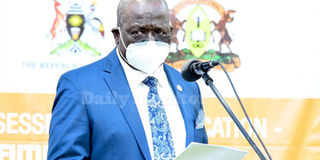UCE: 50% candidates fail to achieve minimum pass 8 in science subjects

UNEB executive director, Mr Dan N Odongo addresses the media during the release of the 2020 UCE results on July 30 at State House. PHOTO/DAVID LUBOWA
What you need to know:
- They also showed poor mathematical skills required in calculations and inability to write the correct symbols of elements, formulae of compounds and equations.
The Uganda National Examination Board (UNEB) revealed Friday that ‘‘science subjects were poorly done with nearly half of the candidates failing to achieve the minimum Pass 8 grade level for each academic subject taught O’level.
“Worth noting with concern is the overall pass levels for Science subjects where nearly half of the candidates have not achieved the minimum Pass 8 level. Chemistry remains the worst done subject,” UNEB executive director, Mr Dan N Odongo said during the release of the 2020 Uganda Certificate of Education (UCE) examinations at State House Nkasero.
However, he noted that ‘‘there is an overall performance improvement in the large entry subjects except Geography, Chemistry and Biology- although Biology showed a slight upgrade at the Distinction 2 (D2) level.
According to Mr Odongo, science related examination papers are carefully constructed and go through necessary stages to ensure validitysuch that they test the candidates’ knowledge, understanding, and ability to apply the knowledge acquired.
‘‘Students should also be able to apply basic scientific knowledge to solve problems in their environment,’’ he urged.
UNEB data further indicates that performance in English Language has improved.
‘‘However, for composition writing, teachers in some schools are still making learners cram passages from what they call “model compositions” with unusual and difficult vocabulary. They then reproduce the crammed passages,’’ the UNEB Chief said.
He explained that ‘‘candidates also found difficulty in extracting appropriate information from the comprehension passage to correctly answer related questions,’’ adding that ‘‘there are also weaknesses in using the correct grammar in sentence construction.’’
“In Sciences, the problems have remained the same as in recent years. Candidates showed weaknesses in the handling of apparatus during the practical tests. The weaknesses were also shown in making and recording observations and drawing conclusions from those observations; tabulation of experimental results and interpretation of the results to meet the demands of the question,” he said.
Poor skills
Mr Odongo added: “They also showed poor mathematical skills required in calculations and inability to write the correct symbols of elements, formulae of compounds and equations. Some candidates merely forged figures of experimental results in the practical papers. Most candidates showed lack of practical experience as many schools tend to handle practical aspects of the curriculum much later in the course. As a result, students do not develop the necessary skills. This could explain why most malpractice cases are in science practical papers.”
Regards to candidate’s performance, Mr Odongo said the female candidates performed better than males in English Language, while in other large entry subjects, male candidates show better performance, with the differences more marked in Mathematics and the Sciences.
He said this trend in the disparity between the performance of male and female candidates has been observed over the years.




